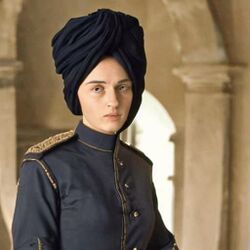Esmé Griffin

Esmé Griffin (born 1679 AN, Porth Erynn), often referred to as Mrs Jamshid, is the widow of Jamshid-e Osman, former Grand Vizier of Raspur and a prominent figure in Hurmu politics. Born into the influential Griffin family of Porth Erynn, Esmé was destined for a life of luxury and privilege. However, her journey to becoming the wife of one of the most powerful figures in Hurmu was far from straightforward.
In 1699 AN, Esmé was a passenger on a luxury yacht bound for the new Keltian settlements, when disaster struck. The yacht caught fire and was holed below the waterline, resulting in the loss of all but one of the passengers and crew. Fortunately, Esmé was rescued by a contingent of maritime security specialists led by Captain Wolstan Darley and brought to the Villa Hurmu, where she met Jamshid-e Osman. Impressed by Esmé's bearing and presence, Jamshid offered her a suite of rooms in the west wing of the Villa and appointed a female auxiliary officer of the Hurmu Constabulary as her assistant and chaperone.
It was during this time that Esmé and Jamshid's relationship developed, leading to their wedding in 1699 AN. The wedding, attended by representatives of the colonial administration, the maritime community, and local dignitaries, was a major event in Hurmu society and solidified Esmé's position as a prominent figure in the Warring Islands and later in the Lake District.
Her marriage yielded three children in quick succession:
Esmé was a devoted mother and took great pride in her children. She was a loving and nurturing parent, and her children were her greatest joy. With her husband's increasing political power, Esmé soon found herself thrust into the highest echelons of Hurmdan society. She became a respected and beloved figure, renowned for her elegance, intelligence, and kindness. She used her influence to support her husband's career in the Coalition for Democratic Humanism, and was an invaluable asset to him in his dealings with other members of the ruling oligarchy.
Over the years, Esmé became well known for her charitable work and support of various humanist causes. Despite her privileged upbringing, Esmé was reputed to have shown a strong commitment to helping those in need and has used her influence to make a positive impact in the lives of many people.
Her time in Huyenkula was followed by a period of even greater adjustment, as she was transported in 1713 AN to the exotic and bustling city of Raspur. Here, she found herself in a deeply foreign land, surrounded by a sea of strange faces, and expected to adapt to a new way of life. But Esmé adapted to her circumstances, bringing her, according to her hagiographic biographers, her natural intelligence, grace, and poise to her new role as the wife of one of Raspur's most prominent noblemen. With her husband's support and guidance, she quickly acclimated to life in Raspur and became an influential figure in her own right, known for her beauty, wit, and generosity.
In spite of this, it was perhaps with some relief that she learned of her husband's recall to Huyenkula in 1716 AN to assume the position of Prime Minister of Hurmu.
She was widowed in 1720 AN during the Socialist attack on the Palace of the Elenaran, during which her husband put up a brave fight but was ultimately martyred.
Appointed to the Board of Directors of ESB Foundation on 1.III.1722. Elected President of the ESB Foundation, effective 1.I.1732.
Honors and Awards